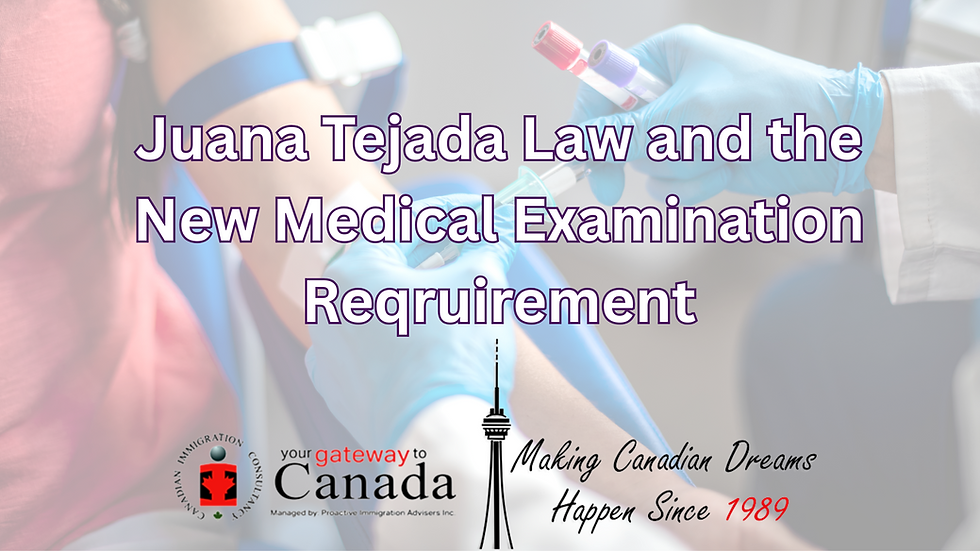From the Juana Tejada Law to Express Entry: Canada’s Up-Front Medical Examination Requirement
- Aug 15, 2025
- 3 min read

In 2010, Canada introduced a regulatory change widely known as the “Juana Tejada Law.” This change was prompted by the case of Juana Tejada, a Filipina caregiver in Canada who, after passing her initial medical exam to qualify under the Live-in Caregiver Program (LCP), was later denied permanent residence due to a serious illness. Her situation highlighted a clear injustice: caregivers who had already dedicated years of service in Canada were being asked to undergo a second medical exam, putting their permanent residency at risk.
To correct this, Section 30(1)(g) of the Immigration and Refugee Protection Regulations (IRPR) was amended to exempt LCP applicants from having to take a second medical examination. This became the celebrated Juana Tejada Law.
Why the Juana Tejada Law Was Repealed
In 2017, the federal government repealed Section 30(1)(g) through SOR/2017-78. By then, the LCP had already closed to new applicants (in 2014) and was replaced by two pilot caregiver programs. Unlike the LCP, these new programs required applicants and their family members to complete a medical exam upfront with their initial application.
However, under these new caregiver programs, there are applicants who already completed a medical exam to enter Canada as a temporary foreign worker or international student, yet they will now be required to take a new medical exam when applying for permanent residence. This adds extra cost and burden to applicants who have already proven their admissibility and contributed to Canadian society.
The government described the repeal as part of “reducing redundancies” in immigration regulations. In practice, it aligned caregiver programs with broader immigration policy: all applicants must now demonstrate medical admissibility before being considered for permanent residence.
Yet, this raises a significant fairness issue. Caregivers—and indeed all permanent residence applicants—perform essential roles or contribute in meaningful ways, yet the up-front medical exam imposes additional hurdles even on those who have already been living and contributing in Canada. Many argue this approach is contrary to the principles behind the Juana Tejada Law, which aimed to protect applicants from being penalized for medical conditions that developed after fulfilling their work or residency requirements.
Express Entry and the New Up-Front Medical Requirement
Starting August 21, 2025, Express Entry applicants will also be subject to the up-front medical exam requirement. Whether applying through the Federal Skilled Worker Program, Canadian Experience Class, or Federal Skilled Trades Program, applicants must submit a current medical examination when applying for permanent residence.
This raises questions for applicants already in Canada:
A student who completed a medical exam for a study permit may need to take another for Express Entry.
A temporary foreign worker who passed a medical exam for a work permit may also be required to take a fresh exam.
While the government states that medical exams are necessary because health conditions can change and to prevent excessive demand on the healthcare system, this reasoning applies universally to all PR applicants and is arguably unfair. It imposes new burdens on applicants who have already demonstrated their eligibility and contribution, contradicting the fairness principles highlighted in the original Juana Tejada Law.
What Applicants Should Know
Medical exams are time-sensitive. Immigration medical exams (IME) are typically valid for 12 months. If your exam is older, a new one is generally required.
Being in Canada doesn’t exempt you. Even if you completed a medical exam for a study or work permit, you may need a fresh exam for Express Entry.
Policy consistency vs. fairness. While the policy ensures uniformity, it imposes additional burdens on applicants who have already been living and contributing in Canada, raising fairness concerns for all permanent residence applicants.
Final Thoughts
The story of the Juana Tejada Law remains a reminder that community advocacy can drive meaningful change. However, its repeal and the new Express Entry medical requirements show Canada’s shift toward standardization and uniformity, even at the expense of fairness.
For all permanent residence applicants, this means careful planning is necessary: consider the cost, timing, and logistics of medical exams, even if you have already completed one for a temporary visa.








Comments